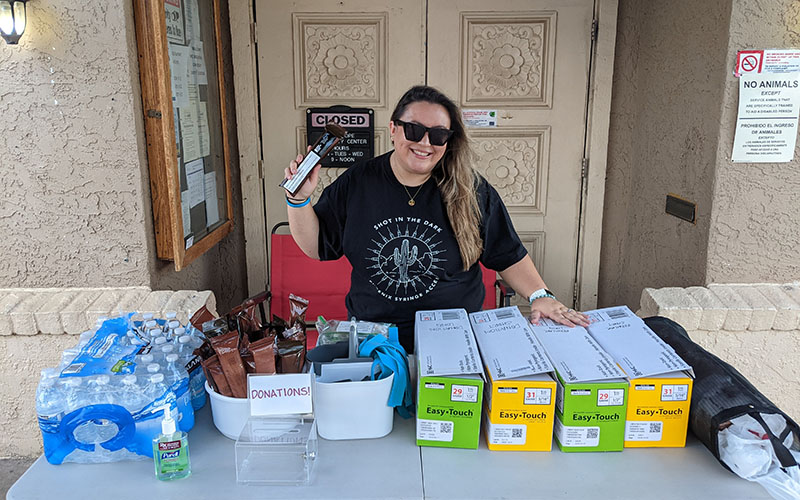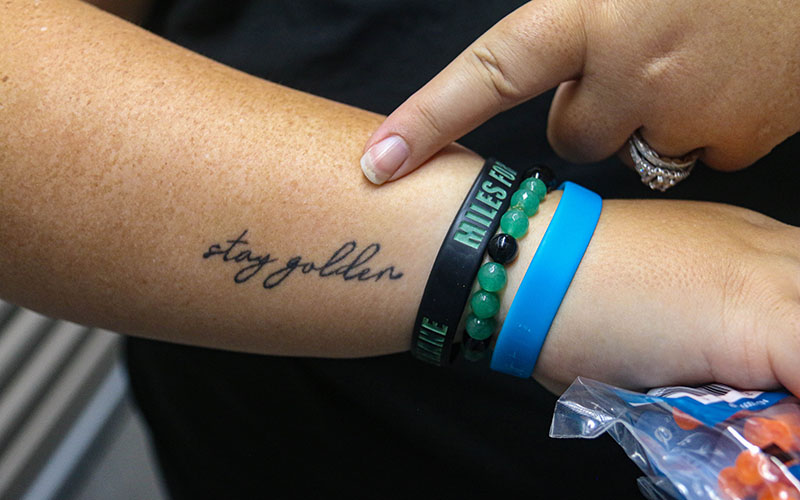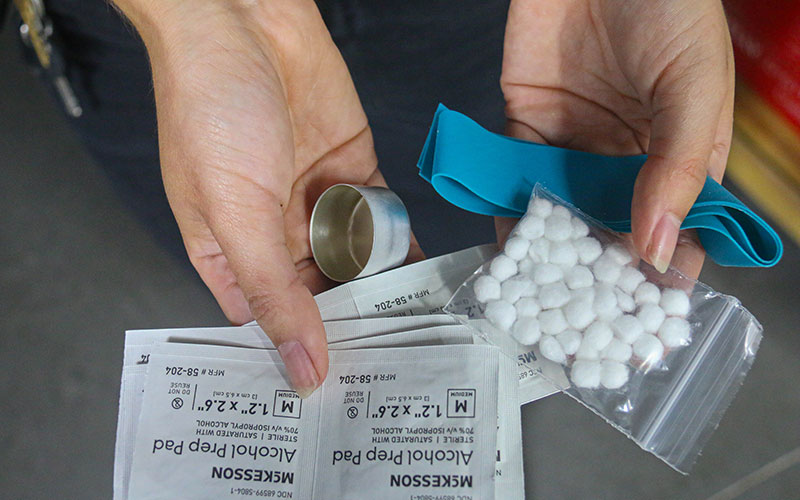
Jaclyn Brown is a volunteer coordinator for the Arizona nonprofit Shot in the Dark, which provides drug users with clean syringes, medication to reverse an opioid overdose and fentanyl testing strips. (Photo courtesy of Jaclyn Brown)
PHOENIX – More than two years after losing her brother to a heroin overdose, Jaclyn Brown has transformed her grief into action. Since August 2020, Brown has served as the volunteer coordinator at Shot in the Dark, a nonprofit that provides clean syringes, opioid overdose medication, fentanyl test strips and other resources to people struggling with addiction.
Until this week, needle exchange programs like this one were illegal in Arizona. Gov. Doug Ducey in May signed a measure that legalizes such efforts. Another measure decriminalizes the use of strips that can detect the presence of deadly fentanyl in pills, powder or injectable drugs.
The new laws come amid surging overdose deaths in the state and the nation, and communities of color are seeing the greatest increases in drug overdoses.
Shot in the Dark and similar programs bridge gaps in access to resources that can reduce harm from drug use. From 2017 to 2020, for example, such groups gave out more than 3.7 million doses of naloxone, a medication used to reverse opioid overdoses.
As Shot in the Dark resumes its pre-pandemic operations this fall, Brown spoke with Cronkite News about the work she does and her approach to addressing the issue of substance abuse in her community.
How did you first get involved with Shot in the Dark?
Back in 2010, my younger brother Marc was involved in a car accident. After his car accident, he was in a wheelchair for a couple of months, and in that time he was given oxycodone. Once his prescription was out, it evolved into a heroin addiction. … He tried to go to rehab a few times, but in November of 2018 he passed away of a heroin overdose.
I didn’t like the idea of my brother’s life being reduced to how he passed away … so I became an ambassador for Shatterproof, which is a national nonprofit focused on reducing the stigma around addiction. I started with writing blog posts and being honest about it … and then I started getting into the idea of harm reduction.
I started with Shot in the Dark last August – because summer in the middle of the pandemic was a good time to do that, I guess.

Jaclyn Brown started working with Shot in the Dark after her brother, Marc, died from a heroin overdose in 2018. The tattoo on her arm says “Stay golden,” a phrase her brother used frequently. (Photo by Gianluca D’Elia/Cronkite News)
Could you explain what harm reduction is?
With harm reduction, we’re not telling you what to do if you come to one of our sites. We’re letting you know: We’re here to help you, and we have things that will help you reduce the risk. We’re going to give you Narcan (which reverses opioid overdoses). We’re going to give you clean syringes.
I think with harm reduction, people think that we’re enabling. But in reality, this is a place where people can come where they know they’re not going to be judged. There’s not going to be stigma. There’s not going to be this push for them to get into rehab. I was one of those people. I would bother my brother all the time: “I think you should go to rehab, I think you should go to rehab.”
Harm reduction is a form of recovery. If someone was using five times a week and now it’s three times, that’s an improvement. And there are a lot of people who, after a while, will say, “Hey, I think I’m looking to get into treatment.” Then they feel more comfortable to have that conversation because we’re building that community with them.
Arizona just legalized fentanyl test strips and needle exchanges. How will that affect your work?
It’s definitely a good step because we were doing it illegally for a long time. … Now that it will become legal … I’m sure other harm reduction organizations will start to pop up. We’re only in four parts of the city, but this entire city needs coverage. I would love to have other organizations come in.
Working together on this is the key to really do something bigger and more effective in the Valley. … I’m really hoping it will open up grant funding or open up exposure to the harm reduction world.
What policy changes would support the work you’re doing?
There needs to be wraparound services. If someone leaves a treatment facility, there needs to be that support. … There are people who want to get into treatment, but there are a lot of barriers. On top of it, there are people who don’t want to go to a hospital or an urgent care just because of the judgment they’re going to get. We have a system where people have to really jump through hoops.
There’s also talk of decriminalization. … Instead of these people going into jail, they have the option to go into treatment.
What are some misconceptions about addiction?
If someone were to picture someone who has an addiction, they would probably assume that they were experiencing homelessness or that they have done a bunch of bad things. In reality, we do serve a population that is experiencing homelessness, but we also serve a population that rolls up in nice vehicles and that have homes. We have people who are young. We have people in their 70s and 80s. It’s all across the board.
Additionally, it’s not just that people are using things illicitly. There are people who misuse prescription medication. It’s not just that everyone’s on the street buying drugs.
What would you say to people whose loved ones are struggling with addiction?
As a family member, there were times I had to draw boundaries because it just got to be too much. It’s a very delicate balance of trying to help someone but also not draining yourself. So I think communication and not stigmatizing any further is a big piece.
Probably the best thing that you could do for that person is to let them know that you are there with them to help them through this. Far too often, a lot of people will kick people suffering from addiction out of their lives, and that loneliness does not help.
Maintaining an open, honest dialogue with that person is extremely important because you’re showing them: I’m not judging you. I’m going to love you no matter what. If you want help, I’m here to help you.

